| Srl | Item |
| 1 |
ID:
131988
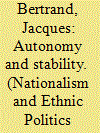

|
|
|
|
|
| Publication |
2014.
|
| Summary/Abstract |
Autonomy is often seen as an institutional instrument to manage substate nationalist conflict. Its implementation is key in determining its impact on conflict. While the central state might be satisfied with the absence of violence and stability as a measure of success, an aggrieved group will view success as gaining new powers and new resources. Autonomy often unravels when different goals are being pursued during implementation. "Special autonomy" in Papua failed because, first, the law was not the product of negotiation but of a solution that the central government imposed; second, Papuans remained divided on its utility and, ultimately, failed to seize the opportunity provided; third, the central government undermined the law in its attempts to curb secessionism, ultimately failing to make it credible.
|
|
|
|
|
|
|
|
|
|
|
|
|
|
|
|
| 2 |
ID:
131987
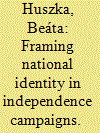

|
|
|
|
|
| Publication |
2014.
|
| Summary/Abstract |
During secessionist mobilization in a multiethnic environment, the use of a discourse that excludes minorities can create internal enemies; meanwhile, co-opting minorities through inclusive framing can turn them into allies. From the standpoint of what sort of identity constitutes the basis of a nationalist movement, my fundamental argument is that the most crucial factor is whether there is a widespread perception of internal threat associated with the presence of a local minority. The chance of such perceptions of a threat emerging among the majority increases if the minority is politically linked to the center or a neighbor that is hostile to the movement. Yet, this explanatory model can show only a tendency depending on the structural setting; it cannot explain the timing and nature of identity shifts. I demonstrate that it is possible to include previously excluded minorities into the national collective through a reframing of national identity, and that the explanation of ethnic exclusion cannot be reduced to a simple ethnic security dilemma.
|
|
|
|
|
|
|
|
|
|
|
|
|
|
|
|
| 3 |
ID:
131989
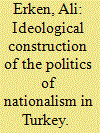

|
|
|
|
|
| Publication |
2014.
|
| Summary/Abstract |
This article analyzes the ideological evolution of Turkish nationalism in politics from 1965 to 1980 providing an in-depth analysis of the ideological contours of the Cumhuriyetçi Köylü Millet Partisi (CKMP; Republican Peasant Nation Party) and its successor the Milliyetçi Hareket Partisi (MHP; Nationalist Movement Party). It shows that there were different channels for indoctrination promoting their own view of nationalism within the movement. It also aims to demonstrate that a tangible shift in the nationalist discourse of the party took place during this period, concomitant to the change of the agents of political nationalism. This transfer of ideological power was reflected in the party's gradually transforming political discourse, swinging from secular nationalism to the margins of religious-conservative nationalism.
|
|
|
|
|
|
|
|
|
|
|
|
|
|
|
|
| 4 |
ID:
131991
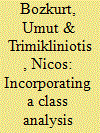

|
|
|
|
|
| Publication |
2014.
|
| Summary/Abstract |
This article has two main aims. First, it aims to challenge the widespread narrative in Cyprus studies that presents ethnic identities as historically inevitable and natural. Rather, identities need to be conceptualized as socially constructed. The second aim of this article is to problematize the argument that ethnic or national groups are homogenous actors. It underlines the need to deconstruct these supposedly unitary actors by making use of a class-based conceptualization of the state. By using such a conceptualization, the article will focus on the period between 1878 and 1974. It will start with a concrete analysis of the class structure in the Cypriot society and then will trace how different classes in both communities positioned themselves vis-à-vis political structures of power and how these positionings paved the way to the division of the island.
|
|
|
|
|
|
|
|
|
|
|
|
|
|
|
|
| 5 |
ID:
131990
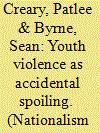

|
|
|
|
|
| Publication |
2014.
|
| Summary/Abstract |
Northern Ireland's current period of relative peace and political stability has been varyingly attributed to large amounts of international economic development assistance and the funding of grassroots peacebuilding work. Yet the post-accord peace is punctuated by seemingly sporadic and isolated acts of violence perpetrated by young people. Using the concept of accidental spoiling, we analyze the perceptions of 120 community group leaders and international funding program administrators pertaining to the causes and effects of persistent sectarian violence among Northern Irish youth and the effect of that violence on the long-term sustainability of peace in Northern Ireland. The views shared by this cross-section of civil society groups suggest that, although economic development assistance has provided opportunities to decrease the inequalities that contributed to the ethnopolitical conflict, low self-esteem, and low self-image, disrupted communities continue to fuel youth interest in violence, thereby raising the potential to harm the peace process. The article concludes by proposing that deeper social reorganizing objectives should be aimed for if Northern Ireland is really to achieve conflict transformation.
|
|
|
|
|
|
|
|
|
|
|
|
|
|
|
|